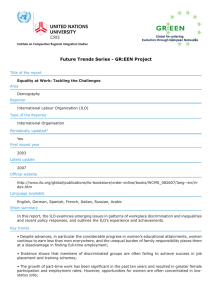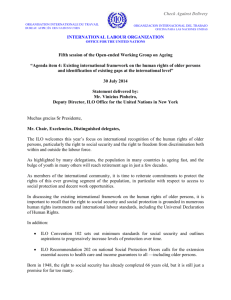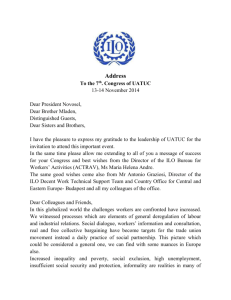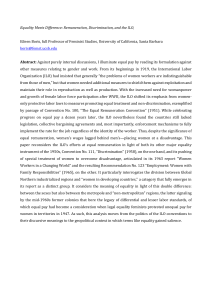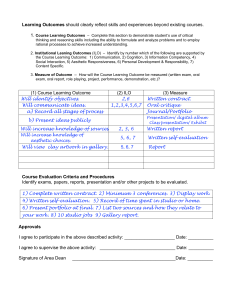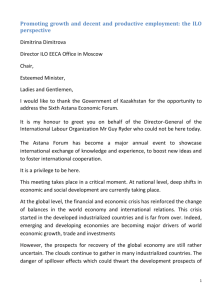Protecting Workers' Health in a Climate of Change: Policy Options... WHO/ILO Roundtable
advertisement
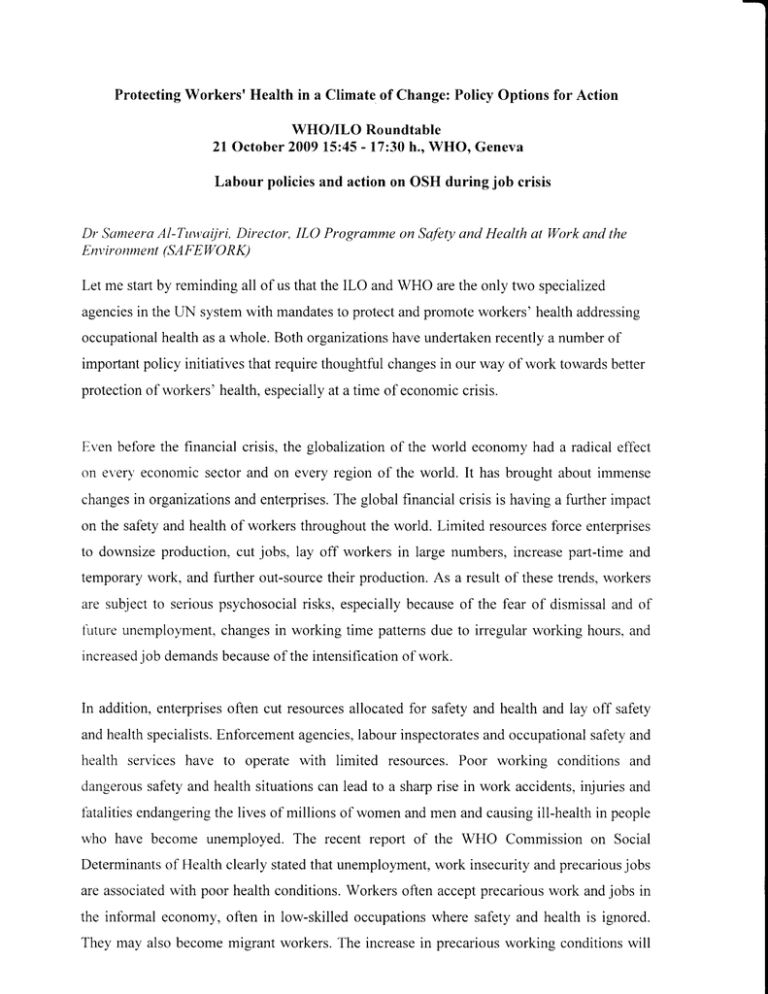
ProtectingWorkers' Health in a Climate of Change: Policy Options for Action
WHO/ILO Roundtable
2l October200915:45- 17:30h., WHO, Geneva
Labour policiesand action on OSH during job crisis
Dr SanteeraAl-Tutuaijri, Direclor, ILO Programmeon Sa/btyand Health at Work and the
Envirorunent(SAF EWO RK)
Let me startby reminding all of us that the ILO and WHO are the only two specialized
agenciesin the UN systemwith mandatesto protectand promoteworkers' healthaddressing
occupationalhealthas a whole. Both organizationshaveundertakenrecently a numberof
importantpolicy initiativesthat requirethoughtful changesin our way of work towardsbetter
protectionof workers'health,especiallyat a time of economiccrisis.
Even befbre the financial crisis, the globalizationof the world economy had a radical effect
on everv economicsectorand on every region of the world. It has brought about immense
changesin organizationsand enterprises.The global financial crisis is having a further impact
on the safetyand health of workers throughoutthe world. Limited resourcesfbrce enterprises
to downsizeproduction, cut jobs, lay off workers in large numbers, increasepart-time and
temporarywork, and further out-sourcetheir production.As a result of thesetrends,workers
are subjectto seriouspsychosocialrisks, especiallybecauseof the fear of dismissaland of
tlture unemployment.changesin working time patternsdue to irregular working hours, and
job demandsbecauseof the intensificationof work.
increased
In addition, enterprisesoften cut resourcesallocatedfor safety and health and lay off safety
and healthspecialists.Enfbrcementagencies,labour inspectoratesand occupationalsaf.etyand
health services have to operate with limited resources.Poor working conditions and
dan-gerous
saf'etyand health situationscan lead to a sharprise in work accidents,injuries and
tatalitiesendangering
the lives of millions of womenand men and causingill-healthin people
who have become unemployed.The recent report of the WHO Commission on Social
Determinantsof Health clearly statedthat unemployment,work insecurityand precariousjobs
are associatedwith poor health conditions.Workers often acceptprecariouswork and jobs in
the infbrmal economy, often in low-skilled occupationswhere safety and health is ignored.
They may also becomemigrant workers. The increasein precariousworking conditionswill
pose an additional risk for accidents and ill-health in micro-enterprisesin the informal
economy,where the formal managementstructureis poor and economic survival is the first
orioritv.
Thesechangesin work patternsand forced restructuringmake the managementof safetyand
healthdifficult. Reducedproductionreversesthe tight schedulesand peaks of intensivework
in production and serviceswhich were prevalent before the crisis. Some employeescome
under pressureto acceptadditional workloads and extra hours to compensatefor the lack of
humanand financial resources.Such situationstend to result in additionalphysicaland mental
stressand burn-out.Overall, the managementof traditionalhazardsand risks is weakeneddue
to the requirementsof necessaryreductions in production costs. The incidence of work
accidentsand diseasesis expectedto rise becauseof the presenteconomiccrisis, as some
companiesand governmentsaretemptedto lessenthe enforcementof OSH standards.
The position of the ILO is clear and firm
Thus,becauseof well-known economicdifficulties, worker protectionmay not be found
amongthe priorities for action.But it has neverbeenacceptedby the ILO that worker
protectionshouldbe properlyaddressed
only in timesof economicupturn.It is universally
acknowledgedthat a healthyworkforce is critical to reachingsustainableeconomic
As we all understand,
development.
coherentnationalOSH policies,actionsby employers'
andworkers'organizations
and the implementation
of labourpoliciesadvocatedby the ILO
and healthpolicies advocatedby the WHO are critical to keep socialprotectionhigh on
technicaland political agendas.
Socialprotectionmust be preservedfor the millions of peoplewho have lost, areaboutto lose
or mav lose their jobs in the furlure. While many international organizationsand national
governmentsare trying to find effective and sustainablesolutionsto the problems causedby
the currentcrisis,rve must continueto stresswhat could easilybe forgottenduring suchtimes
but which is part and parcelof the ILO's DecentWork Agenda:the right of everyoneto a safe
and healthy working environment.This right should not be compromised during times of
financial constraints.We need to make sure that the right to a safe and healthy working
environmentis not eliminated from national and enterpriseagendaswhile waiting for better
times. It is precisely this way of thinking that has led the world to where it is today: the
thinking behindthe short-termbusinessmodel. Following this model in the implementationof
safety and health rules may backfire in the future. While it is true that the countriesof the
world shouldconcentrateat the presenttime on the restorationof sustainableproductivity and
equity,they needto do this with the full respectof labour standards,including thoserelatedto
occupational safety and health. Only this will ensure that people live socially and
economicallyproductivelives.
This year, the International Labour Conferenceadopteda Global Jobs Pact to give a new
impetusto the implementationof the ILO DecentWork Agenda at a time of economiccrisis.
The ILO and WHO are also the lead agenciesunder the UN Joint Crisis Initiative entrusted
with the responsibilitiesfor building a social protection floor of essentialservicesand
mechanismsto safeguardhuman developmentat a time of financial and economiccrises.
Social equity, income security,efficient health servicesand the protection of workers against
work-related accidents and diseasesare seen as instruments needed to protect jobs and
employment and to promote application of international labour standards fbr better
maintenanceof safe and healthy working conditions and for better protection of workers'
health.To this end, the core of ILO action will continueto be the provision of its international
instruments (Conventions and Recommendations)and legal frameworks for developing
occupationalhealth policies and programmesand for strengtheningnational OSH systemson
a tripartitebasis.
The situationwith the provision of occupationalhealthcan be seriouslyexacerbatedat a time
of crisis. However, we are well equippedto addressadequatelymany continuing challenges
that arise in the area of social protectiontoday. The ILO Global Strategyon Occupational
Safetyand Health has laid the foundationfor integratedaction that should better connectthe
ILO's occupationalsafetyand health standardswith other meansof action, such as advocacy,
knowledge development, management,information dissemination and
a\\'areness-raising,
technicalcooperationto maximize impact. The implementationof the Global Strategygives
rise to nationaltripartite commitmentsand nationalactionsto foster a preventiveapproachto
the achievementof lasting improvementsin safety and health at work. Another powerful
instrumentfor the global action on worker protectionis the ILO Convention Concerningthe
It providesa solid basisfor development
PromotionalFrameworkfbr OSH,2006, Q.{o.187).
of comprehensivenational OSH policies and programmeswith emphasison specificnational
priorities.Despitethe crisis, it has alreadyreceived12 rutrftcationsto date.Today, we should,
more than ever, focus our efforts on the promotion of the guiding principles embeddedin
theseand other ILO safety and health standardsadoptedby the ILO constituentsin order to
translatethem into practicalactionsnationallyand internationally.
The ILO's comparativeadvantagelies to a large extent with its social protection objectives.
The ILO standsfirmly by this core elementof its mandateto protect workers againsthazards
to their safety and health. We believe that only a safe and healthy workforce can build a
sLrstainable
economy.Now, at a time of crisis,the world haslearnedthe lessonthat it is better
to act than to react.It is then high time to apply a preventiveapproachin all sectorsof the
economyin order to preventa truly human crisis.
In closing,I would like to cite Mr Juan Somavia,Director Generalof the ILO, who has
repeatedlyunderlinedthat "The current economic crisis should not be an excuseto lessen
decentworking conditions,but an opportunityto promotethem."
Thankyou lor your attention.
